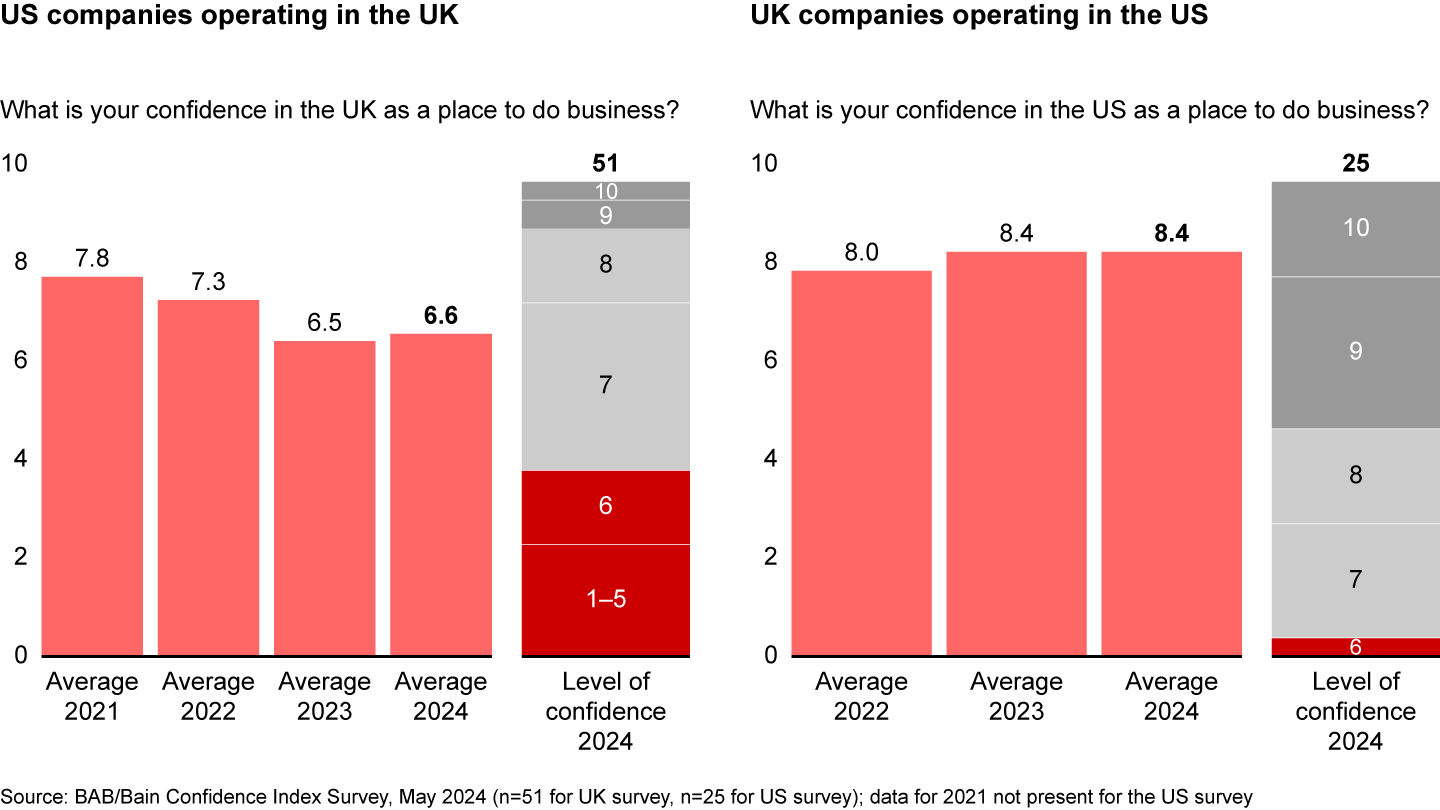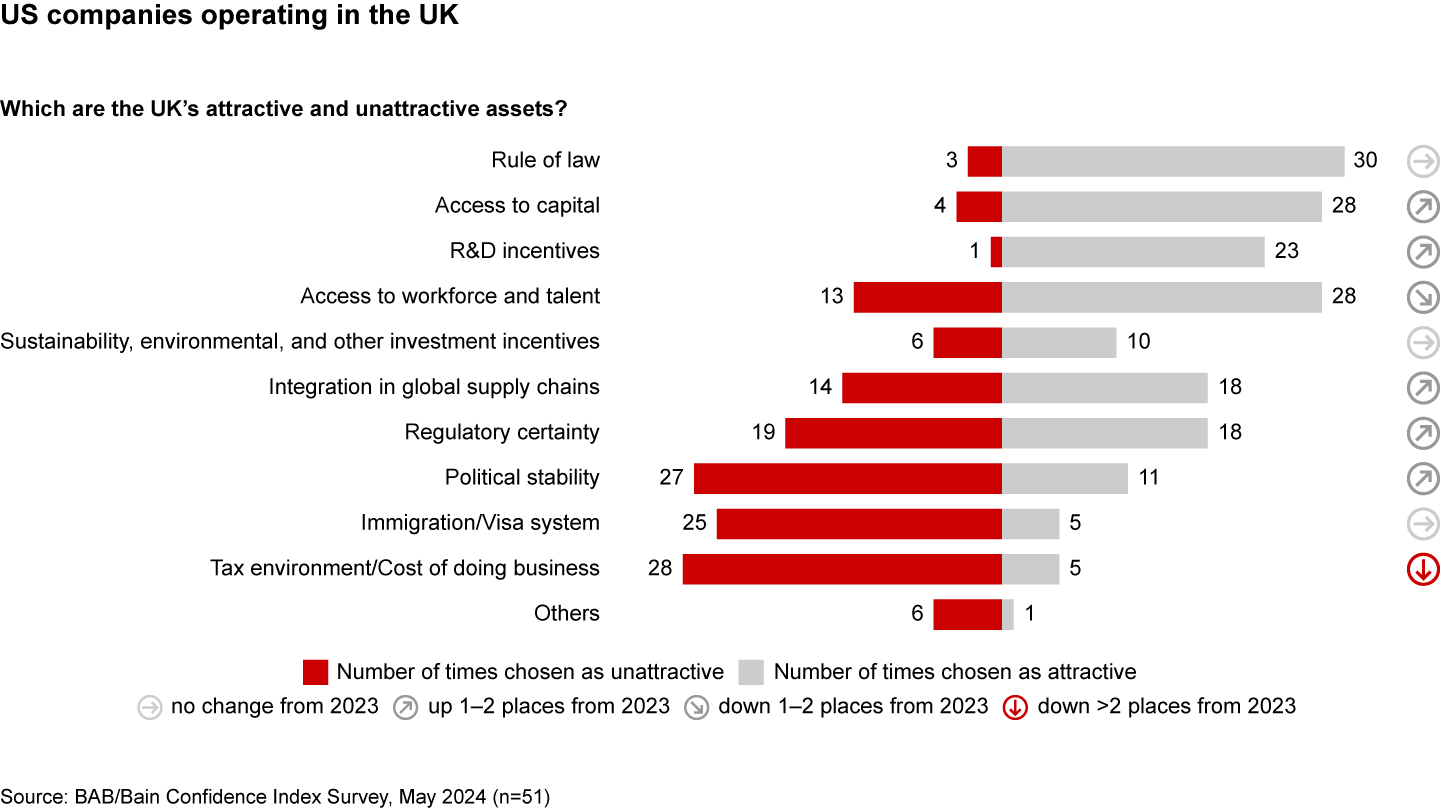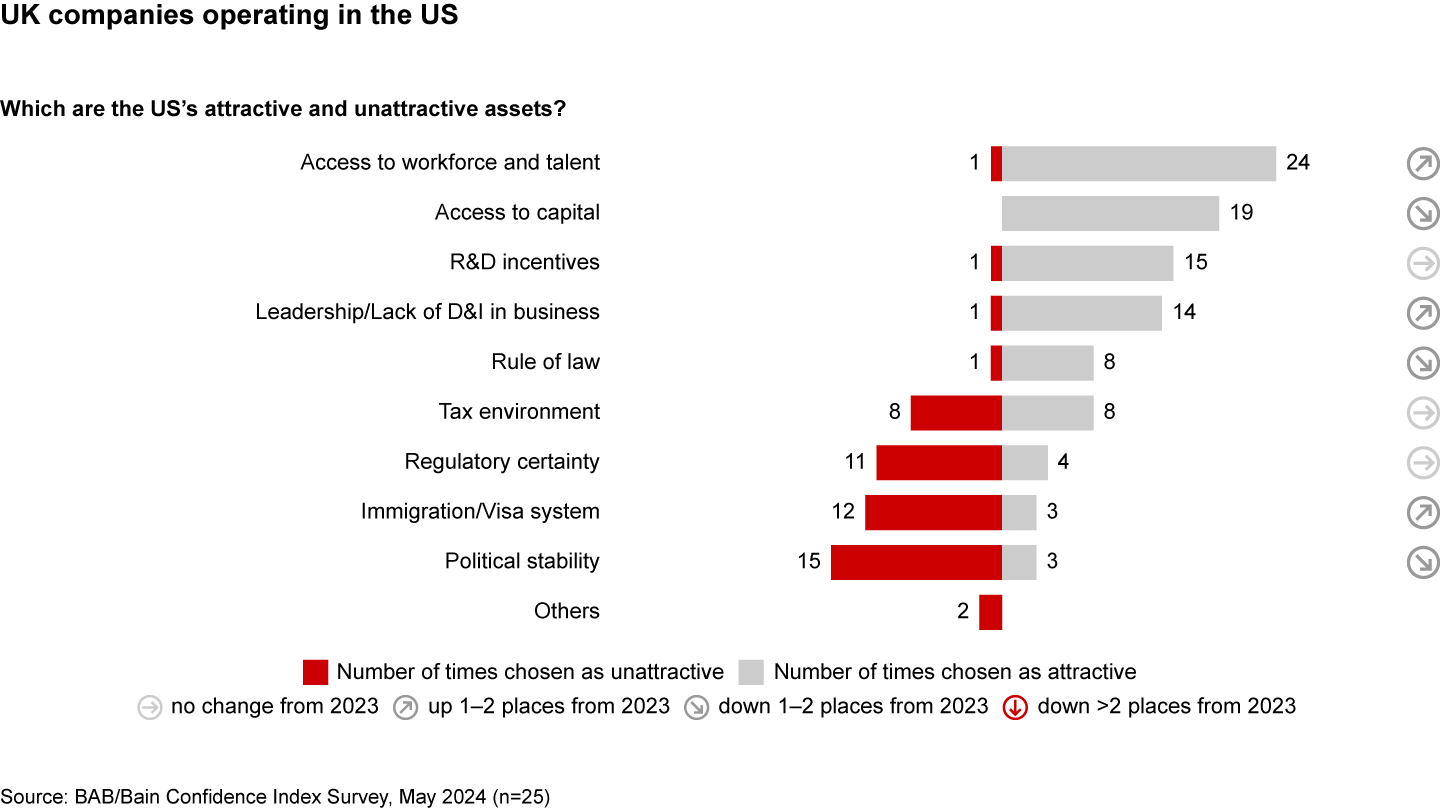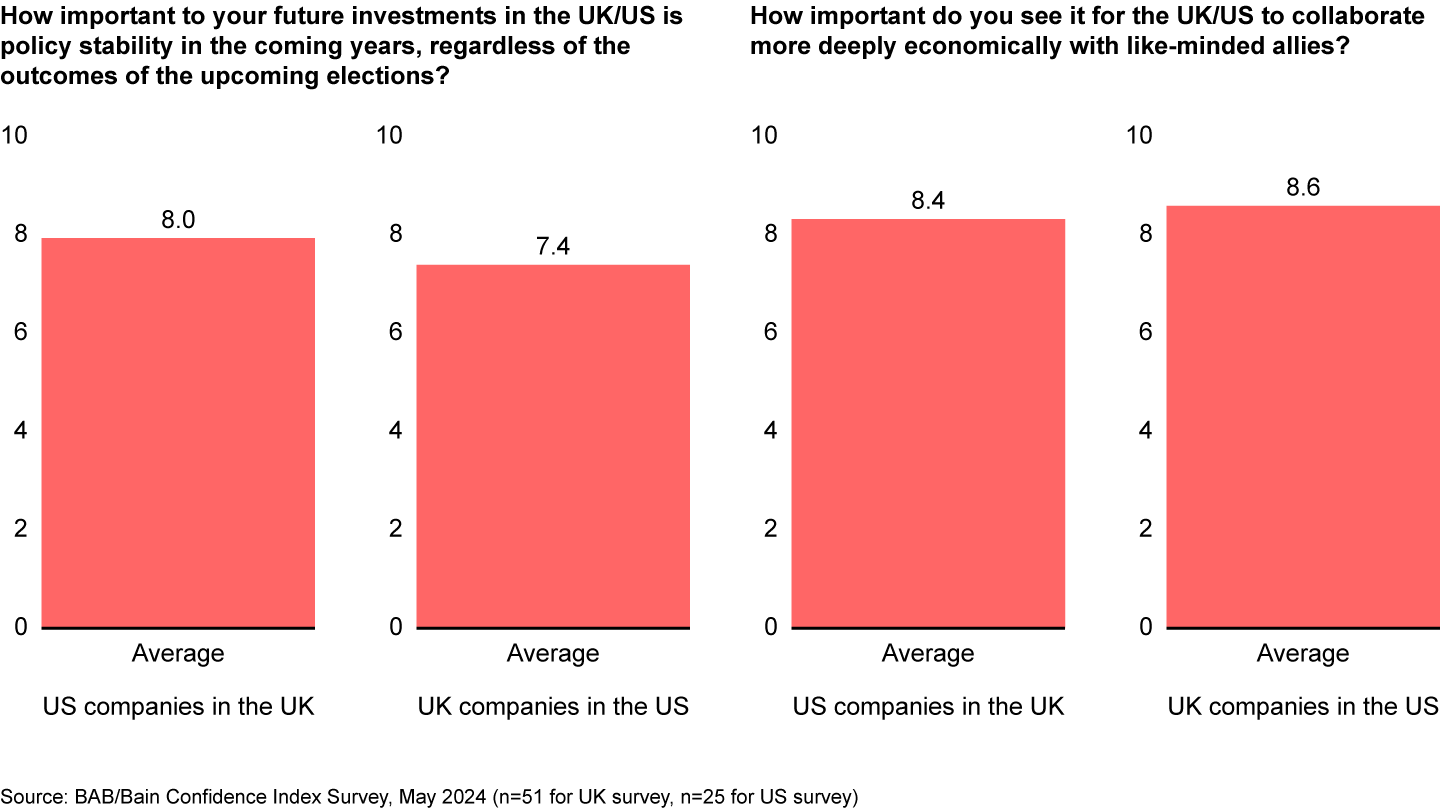Brief

At a Glance
- The fourth edition of the Transatlantic Confidence Index by BritishAmerican Business and Bain & Company highlights a stable confidence level in the US-UK economic corridor for 2024.
- US companies’ confidence in the UK business environment has stabilised after years of decline, while UK companies’ confidence in the US remains high.
- Tax competitiveness emerged as a top priority, ranking as a top three concern for US and UK companies, driven by continued concern over the high tax burden in the UK and upcoming US tax reviews in 2025.
- Companies on both sides of the Atlantic emphasise the need for stable policies and support for deeper transatlantic economic collaboration remains high, with businesses ranking a trade agreement higher than sectoral deals.
With the UK general election having taken place on 4 July and the US general election in November, 2024 will be a watershed year. It has also been relatively calm within the US and UK following years that included the UK’s departure from the EU, the Covid-19 pandemic, the economic turmoil during the short-lived Liz Truss UK premiership, rampant global inflation, and increases in the cost of doing business on both sides of the Atlantic.
Written in collaboration with
Written in collaboration with

There has been cautious optimism around new technologies and their potential effect on productivity, as the artificial intelligence (AI) industry has taken off in both countries. Conversely, ongoing conflicts between Russia and Ukraine and in the Middle East, plus increasing tensions between the West and the People’s Republic of China, increasingly dominate policymaking on both sides of the Atlantic.
The fourth edition of the Transatlantic Confidence Index, issued by BritishAmerican Business and Bain & Company, considered these contexts for our 2024 analysis.
This year, we surveyed 51 major US companies conducting business in the UK and 25 major UK companies conducting business in the US. These companies represent 320,000 employees and more than 3,700 years of collective experience, with operations in every region of the UK and more than 34 US states.
Confidence in the US-UK corridor is stable in 2024
Confidence in the US and UK corridor remains mostly unchanged from last year, with a score of 7.1 out of 10, compared to 7.0. US companies’ confidence in the UK as a place to do business is stable at 6.6, up slightly from 6.5 in 2023 after two years of decline. UK companies maintain high confidence in the US, with a score of 8.4 (see Figure 1).
Investors in both countries report stable or increasing confidence levels and plan to maintain or increase their investment in both markets. This suggests a continued underlying strength in both markets and the US-UK economic relationship despite the sociopolitical events described in previous years.
We note that confidence among US investors in the UK has stabilised after a significant decline from 7.8 (out of 10) in 2021 to 6.5 in 2023. US confidence in the UK-EU relationship, though still moderate, increased for the third year in a row, to 6.1 in 2024 from 5.1 in 2021. We attribute this stabilisation to distance from the economic and policy turbulence that began in 2016 and recent positive moves towards better UK-EU relations.


The UK’s and US’s strengths and weaknesses are also largely unchanged from 2023 (see Figures 2a and 2b). The US was praised by respondents in both 2024 and 2023 for innovation, capital, talent, and investment incentives, but respondents raised concerns about political and regulatory stability and issues related to talent mobility and immigration. Similarly, respondents consistently praised the UK for the rule of law, talent, and capital, but there were concerns about political stability and talent mobility.
This year, the UK tax environment and cost of doing business took a significant hit, standing out as the only notable negative shift in an otherwise stable outlook from respondents. Ensuring tax competitiveness is now a top three priority for UK investors in the US.




US and UK companies look for continued stability and deeper economic collaboration
Companies in both the US and the UK are looking for stable policies and stronger economic collaboration between the two countries. Our survey respondents rated the importance of policy stability, regardless of the outcome of 2024 elections, at 8.0 in the UK and 7.4 in the US. US companies in the UK rated the importance of greater economic collaboration with like-minded allies at 8.4, and UK companies in the US at 8.6 (see Figure 3). This likely reflects the changes in trade policy patterns we observed over the past 12 months. It equally emphasises that the US and UK should be among those friendly nations that increase their economic collaboration.


Sixty-one percent of respondents support a full free trade agreement (FTA) between the US and UK, making it the second-highest priority for the US-UK relationship. Interestingly, most companies prefer a full FTA to sectoral agreements but are also interested in measures short of a full FTA—for example, existing transatlantic dialogues on AI and other technologies—plus the commitments set out in the Atlantic Declaration. The latest edition of the BritishAmerican Business Atlantic Declaration Progress Review details these priorities and the progress made by both governments since the document was signed in June 2023.
Beyond deeper economic collaboration between the US and the UK, the results show businesses support domestic industrial strategies. There’s continued positivity for the US’s Inflation Reduction Act, the Infrastructure Investment and Jobs Act, and the CHIPS Act, with more than half of respondents citing full implementation as a top three priority. In the UK, there’s a call for clarity and emphasis on a renewed industrial strategy, with more than half of respondents ranking “creating” an industrial strategy as a top three priority.
Tax competitiveness stands out in this year’s survey. It’s been a priority for companies in both the US and the UK, but recent developments, such as higher corporate tax rates in the UK and potential further increases, have made it a top three priority for more than 70% of US companies this year, up from 60% in 2023. This was partly offset by the UK’s capital super-deduction, raising “R&D incentives” to the UK’s No. 3 most attractive asset, up from No. 4 in 2023. In the US, the upcoming 2025 review of the Tax Cuts and Jobs Act has similarly raised concerns for UK companies, with more than 70% citing a competitive tax environment as a top three priority, up from 60% in 2023. Simplified labour mobility between the two countries remains a hot topic, with 66% of respondents prioritising it.
For the UK, the slow but steady improvement in EU relations in recent years is gaining recognition. However, US investors’ top request for the UK government is to further strengthen this relationship, including successfully renegotiating the Trade and Cooperation Agreement (TCA).
An agenda for the next US and UK governments
The US-UK economic corridor has been strong over the long term, bringing investment, jobs, and prosperity to both countries. Our 2024 Transatlantic Confidence Index shows a recent restabilisation of this critical partnership. This stable base, the largest bilateral investment relationship in the world, is an asset for future governments to build on. As globalisation faces challenges from geopolitical tensions, war, and low growth in living standards, deepening the US-UK economic partnership continues to be a powerful lever for both governments.

About BritishAmerican Business
BritishAmerican Business is the leading transatlantic trade association incorporating the British-American Chamber of Commerce in the US and the American Chamber of Commerce in the UK. We are committed to strengthening the economic corridor between the United States and the United Kingdom by supporting policies and actions that protect and enhance the environment for transatlantic trade and investment on behalf of our members. We convene and serve a growing network of companies and business leaders through networking opportunities, bespoke programming and marketing platforms. We actively promote trade and investment and support those who make the transatlantic corridor part of their business growth ambition. For more information, visit www.babinc.org.